|
|
|
Sort Order |
|
|
|
Items / Page
|
|
|
|
|
|
|
| Srl | Item |
| 1 |
ID:
104786
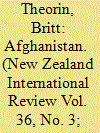

|
|
|
| 2 |
ID:
112881
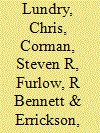

|
|
|
|
|
| Publication |
2012.
|
| Summary/Abstract |
Islamist extremists in Afghanistan and elsewhere are exaggerating their successes in inflicting casualties on American and other International Security Assistance Force (ISAF) forces. This article quantifies the exaggeration for the month of November 2010, putting the claimed casualty rate at approximately one-half battalion per month. It provides an analysis of how and why this is occurring, and links this extremist strategic communication effort to dominant historical master narratives in the region that may produce sympathy among intended recipients of the messages. The authors argue that these measures undertaken by the extremists can be countered successfully through the use of similar story forms, more timely reporting, use of side-by-side comparisons, and use of similar reporting venues. These steps could challenge the credibility of the Taliban reports, reduce sympathy, and diminish potential recruitment.
|
|
|
|
|
|
|
|
|
|
|
|
|
|
|
|
| 3 |
ID:
114969
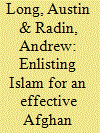

|
|
|
|
|
| Publication |
2012.
|
| Summary/Abstract |
An effective police force is central to providing security in general and is considered especially critical in counter-insurgency. The US Army's counter-insurgency doctrine embodied in Field Manual (FM) 3-24 notes that 'the primary frontline [counter-insurgent] force is often the police - not the military'. The strength and effectiveness of the police is important for waging counter-insurgency for two reasons. Firstly, the police can help directly in fighting the insurgents. In Afghanistan, police fight side by side with the military, and help provide security in many of the most dangerous areas. Secondly, building an effective and trustworthy police force is necessary for legitimising the existing government. When the police force fails to provide security (or worse, preys upon the population) the government is delegitimised. At the same time, the population's cooperation with the police is essential for effective policing. Police that are seen as outsiders simply cannot elicit the trust necessary to police a community. The importance of gaining the population's support also echoes the US military's 'population-centric' approach to counter-insurgency, as enumerated by former International Security Assistance Force (ISAF) commanders General Stanley McChrystal and General David Petraeus. Support from the population is essential to the police's role in fighting the insurgency since the population can, for example, provide the intelligence essential for identifying, locating and killing insurgents.
|
|
|
|
|
|
|
|
|
|
|
|
|
|
|
|
| 4 |
ID:
100021
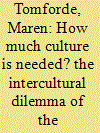

|
|
|
|
|
| Publication |
2010.
|
| Summary/Abstract |
Using the Bundeswehr operation in command of the International Security Assistance Force (ISAF) in Afghanistan as an example, this article follows the assumption that German soldiers find themselves in an 'intercultural dilemma'. Intercultural competencies are expected of them in theatre but they are not always able to apply them and the strategic-political level responsible for the mandate hardly incorporates the 'cultural factor'. However, 'intercultural sensitivity with reservations' will not win the 'hearts and minds' of the local population, or help to guarantee sustainable stability in conflict regions such as Afghanistan. Profound appraisal of the role of local cultures should be of central importance to the tactical-operational level during operations abroad as well as to the strategic-political level at home. The article discusses the tactical-operational level in regard to how much intercultural competence Bundeswehr 'peacekeepers' need and what kind of intercultural challenges they encounter in Afghanistan. On a long-term basis, conflict management, peacebuilding and sustainable development can only be achieved in harmony with the people in the area and not against them or over their heads and needs.
|
|
|
|
|
|
|
|
|
|
|
|
|
|
|
|
| 5 |
ID:
107585
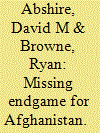

|
|
|
| 6 |
ID:
193063
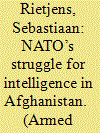

|
|
|
|
|
| Summary/Abstract |
What role did North Atlantic Treaty Organization (NATO) and the coalition (International Security Assistance Force—ISAF) it led play in the failure of the West in Afghanistan? This essay argues that the ISAF intelligence community’s inability to come to grips with the complex operational environment in Afghanistan contributed to the problem. Using three concepts from the complexity literature, requisite variety, learning, and enactment, I analyze critical flaws in NATO’s approach. ISAF’s weak cross-cultural competence, its inconsistent relationships with international civilian organizations, and its absence of double- and triple-loop learning are identified as key drivers of NATO’s weak intelligence performance.
|
|
|
|
|
|
|
|
|
|
|
|
|
|
|
|
| 7 |
ID:
115192
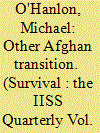

|
|
|
|
|
| Publication |
2012.
|
| Summary/Abstract |
Afghanistan policy debates in NATO capitals these days are about transition. Specifically, by 2014, the NATO-run International Security Assistance Force (ISAF) operation is to end, according to a schedule first proposed by President Hamid Karzai of Afghanistan and later reaffirmed by outside powers at NATO's Lisbon Summit in 2010. By that point, Afghans will have primary security responsibility for all parts of their country - a goal that they will technically reach in 2013, according to the latest plans - and nearly all ISAF troops will be able to depart. The May 2012 strategic partnership agreement between the United States and Afghanistan, reinforced by several other such bilateral accords, will guide relations thereafter; the July 2012 Tokyo donors' conference has added further detail to plans. With these pieces in place, Western policy debates tend to dwell on how fast to bring troops home between now and the end of 2014.
|
|
|
|
|
|
|
|
|
|
|
|
|
|
|
|
| 8 |
ID:
146812
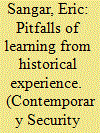

|
|
|
|
|
| Contents |
Why do armies often fail to transmit and coherently apply lessons from their past? Using the concept of ‘layered organizational culture’, this article formulates a pioneering theoretical argument to explain how military organizations learn from their historical experience. Analysing empirical material from internal debates within the British Army, the article observes an inherent incompatibility between lessons gleaned from, on the one hand, the Anglo-Afghan Wars and, on the other hand, British counterinsurgency campaigns after 1945. This is less a result of actual differences in the external context but of changing organizational ‘filters’: different layers of military organizational culture result in different ways of selecting and transmitting relevant lessons from warfare experience. Older and newer cultural layers can interact and thus contribute to incoherent strategy-making in the present. This argument is illustrated by reviewing the layering process within the British Army since the 19th century. The article shows a shift from emphasizing the specificity of local contexts towards the application of universal principles. This has contemporary relevance: co-exisiting yet incompatible historical lessons contributed to significant incoherence in operational strategy during the initial months of the British deployment in Afghanistan in 2006.
|
|
|
|
|
|
|
|
|
|
|
|
|
|
|
|
|
|
|
|
|